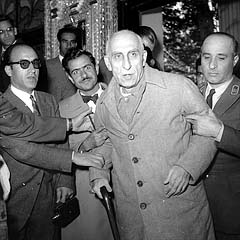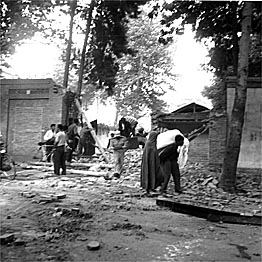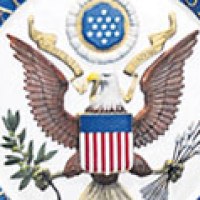This article gives more information on Mohammad Mossadegh, the eccentric nationalist, who was ousted by the 1953 coup in Iran. This article is related to a series of articles on Iran and the rise of fundamental Islam. See the Iran category for the other articles.
MOHAMMED MOSSADEGH
Eccentric Nationalist Begets Strange History
by Elaine Sciolino
First published: april 15, 2000; Mohammad Mossadegh
Except for Ayatollah Ruhollah Khomeini, father of its revolution, no leader has left a deeper mark on Iran’s 20th century landscape than Mohammed Mossadegh. And no 20th century event has fueled Iran’s suspicion of the United States as his overthrow has.
An eccentric European-educated lawyer whose father was a bureaucrat and whose mother descended from Persian kings, Dr. Mossadegh served as a minister and governor before he opposed Reza Shah’s accession in the 1920’s.
He was imprisoned and then put under house arrest at his estate in the walled village of Ahmadabad west of Tehran. Eventually he bought the village, growing crops, founding an elementary school and beginning a public health project.
When Britain and Russia forced Reza Shah from power in favor of his son, Mohammed Reza Pahlevi, in 1941, Dr. Mossadegh became a member of Parliament. He was hailed as a hero for his fiery speeches on the evils of British control of Iran’s oil industry. In 1951, when Parliament voted to nationalize the industry, the young shah, recognizing the nationalists’ popularity, appointed Dr. Mossadegh prime minister.
In that job he became a prisoner of his own nationalism, unable to reach an oil compromise. Even as the British negotiated with Iran, they won the support of the major oil companies in imposing an effective global boycott on Iranian oil.
Still, in the developing world Dr. Mossadegh became an icon of anti-imperialism. He was revered despite his odd mannerisms, which included conducting business in bed in gray woolen pajamas, weeping publicly and complaining perpetually of poor health.
He amassed power. When the shah refused his demand for control of the armed forces in 1952, Dr. Mossadegh resigned, only to be reinstated in the face of popular riots.
He then displayed a streak of authoritarianism, bypassing Parliament by conducting a national referendum to win approval for its dissolution. Meanwhile, the United States became alarmed at the strength of Iran’s Communist Party, which supported Dr. Mossadegh.
In August 1953, a dismissal attempt by the shah sent Dr. Mossadegh’s followers into the streets. The shah fled, amid fears in the new Eisenhower administration that Iran might move too close to Moscow. (The Shah returned 22 august 1953 to Iran, after Royalists and Army overthrew the Mossadegh regime).
Yet Dr. Mossadegh did not promote the interests of the Communists, though he drew on their support. Paradoxically, the party turned from him in the end because it viewed him as insufficiently committed and too close to the United States. By the time the royalist coup overthrew him after a few chaotic days, he had alienated many landowners, clerics and merchants.
After a trial, he served three years in prison and ended up under house arrest at his estate. In March 1967, in his mid-80’s and weakened by radium treatments for throat cancer, he died.
When the revolution brought the clerics to power in 1979, anti-shah nationalists tried to revive Dr. Mossadegh’s memory. A Tehran thoroughfare called Pahlevi Avenue was renamed Mossadegh Avenue.
But Ayatollah Khomeini saw him as a promoter not of Islam but of Persian nationalism, and envied his popularity. So Mossadegh Avenue became Vali Asr, after the revered Hidden Imam, whose reappearance someday, Shiite Muslims believe, will establish the perfect Islamic political community. Still, even Ayatollah Khomeini was careful not to go too far. Ignoring Dr. Mossadegh, rather than excoriating him, became the rule.
Two decades later, the Mossadegh cult has been revitalized by resurgent nationalism and frustration with the strictures of Islam. Dr. Mossadegh inspires the young, who long for heroes and have not necessarily found them, either in clerics or kings.
In campaigns for local elections in February 1999 and parliamentary elections a year later, reformist advertising made use of Dr. Mossadegh’s sad, elongated face. And every year since his death, his supporters have rallied at his estate.
His legacy still stirs considerable debate. In August, Parliament approved a bill to abolish a holiday marking the nationalization of the oil industry in 1951. The decision set off protests in the press.
“Alas! Parliament ignored the most apparent symbol of the struggle of the Iranian people throughout history against colonialism,” the reformist daily Khordad said.
In November, legislators were forced to reinstate the holiday.
Mazzeltov,
Crethi Plethi



 RSS
RSS












@ Crethi Plethi : Your statement ” Except for Ayatollah Ruhollah Khomeini, father of its revolution, no leader has left a deeper mark on Iran’s 20th century landscape than Mohammed Mossadegh. And no 20th century event has fueled Iran’s suspicion of the United States as his overthrow has.” – is clearly not correct and smacks of your bias and misunderstaning of Iran and It’s recent history .
I would instead propose that Reza Shah The Great and Mohammad Reza Pahlavi had left more and deeper mark on Iran’s 30th century landscape then either the drug addict Mossadegh or the charletan Khomeini in his disgise as a Revelutionary or a Shia Mullah .
I agree with you that undoubtedly Reza Shah and Mohammad Reza Pahlavi left their mark on Iran’s landscape and transformed Iran to a modern country during their reign over Iran. Mossadegh was in his era “the Persian representative” of the awakening of Arab Nationalism following the collaps of the Ottoman Empire after WW1. He was therefore a danger for the interests of the US and Britain (oil) and consequently overthrown by a coup. Khomeini, even if he was an imposter, did draw the lines for the next 30 years of Iran’s history with his Islamic Revolution and hatred for Western Society and Iranian reformists: of which Ahmadinejad is an offspring.
[…] against it. Zibakalam compared the nuclear program with the nationalization of petroleum by PM Mohammad Mossadegh in the early 50s, saying that Iranian leaders must learn the historical lesson from Iran’s […]